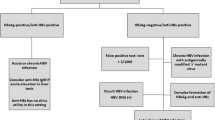Abstract
Background: We conducted a 3-year follow-up study of long-term antibody persistence following vaccination of low-risk preterm infants with recombinant hepatitis B vaccine (HBV). Two three-dose protocols were compared: vaccination beginning within 24 h of birth to initial vaccination delayed until a weight of 2,000 g was reached.
Patients and Methods: The study population included 136 children, divided into three groups: children born prematurely (≤ 35 weeks, n = 57), children born at term (≥ 37 weeks, n = 39), both groups receiving the first dose of HBV within 24 h of birth, and children born prematurely (≤ 35 weeks, n = 40), who received the first dose of HBV when a weight of 2,000 g was reached. All infants received the second hepatitis vaccination 1 month after the first, and the third dose 6 months after the first. Hepatitis B surface antibody (AntiHBs) was measured at an age of 3–3.5 years (at least 2.5 years after completion of the three-dose HBV series). An AntiHBs level of ≥ 10 IU/l was considered positive.
Results: At 3–3.5 years of age, a higher percentage of the premature-delayed vaccination group had a positive AntiHBs level (92.5%) compared to both the premature (54.5%, p < 0.001) and full-term groups (71.8%, p < 0.05) vaccinated soon after birth. The premature-delayed vaccination group also had a significantly higher geometric mean concentration (GMC) (119 vs 14.2 IU/l, p < 0.001 and 119 vs 32.7 IU/l, p < 0.005, respectively).
Conclusion: Delaying vaccination of premature infants against hepatitis B until a weight of 2,000 g was reached resulted in both a significantly higher percentage of children with positive antibody levels and a significantly higher GMC at 3–3.5 years of age as compared to early-vaccinated preterm and full-term infants. The known short-term advantage of delayed vaccination of preterm infants was shown to persist for at least the first 3 years of life.
Similar content being viewed by others
Author information
Authors and Affiliations
Additional information
Received: July 12, 2001 · Revision accepted: January 8, 2002
Rights and permissions
About this article
Cite this article
Linder, N., Vishne, T., Levin, E. et al. Hepatitis B Vaccination: Long-Term Follow-up of the Immune Response of Preterm Infants and Comparison of Two Vaccination Protocols. Infection 30, 136–139 (2002). https://doi.org/10.1007/s15010-002-2068-3
Published:
Issue Date:
DOI: https://doi.org/10.1007/s15010-002-2068-3




